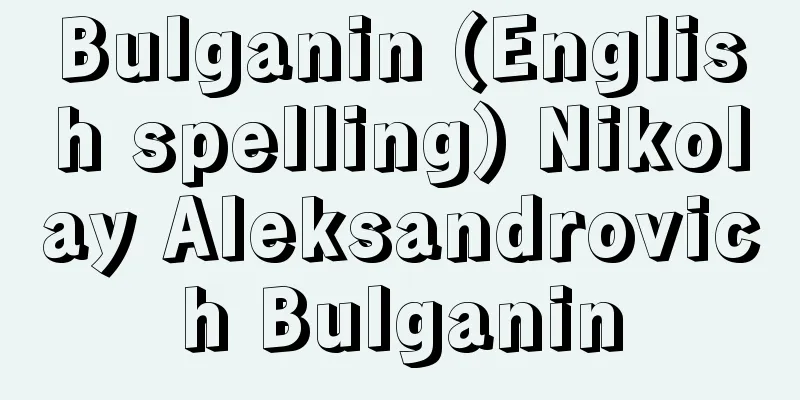Bulganin (English spelling) Nikolay Aleksandrovich Bulganin

|
Soviet politician. He joined the Bolshevik Party in 1917, and during the civil war following the October Revolution, he served in the Committee for the Suppression of Counter-Revolution in his hometown of Nizhny Novgorod, where he became acquainted with Kaganovich, Molotov, and Mikoyan. In 1922, he transferred to the economic department, and in 1927 became the manager of the Moscow Electrical Plant, one of the leading factories in the country. In 1931, he was selected as chairman of the Moscow Soviet, and worked hard to develop the capital, including building a subway network. In 1937, he was promoted to Prime Minister of the Russian Republic, and in 1938, he was promoted to Governor of the State Bank and Deputy Prime Minister of the Soviet Union. When the German-Soviet War broke out, he served on the front lines, and was promoted to Lieutenant General in 1942 and Deputy Minister of Defense in 1944. After the war, he was Minister of Military Affairs and Deputy Prime Minister, a member of the Politburo of the Central Committee of the Communist Party of the Soviet Union, and a marshal. In 1955, in the power struggle between Prime Minister Malenkov and First Secretary of the Party Khrushchev, he supported the latter, and after Malenkov's dismissal, he became Prime Minister. During his three years in office, he and Khrushchev toured many countries and promoted diplomacy of peaceful coexistence. However, domestically, he was critical of Khrushchev's economic policies, especially his plan for industrial reorganization, and in 1957, he formed the so-called "anti-party group" with Molotov and Malenkov, and plotted to oust Khrushchev over this issue. As a result, he was dethroned by Khrushchev in the following year, 1958, and was ousted. [Hara Teruyuki] [References] | | | | |Source: Shogakukan Encyclopedia Nipponica About Encyclopedia Nipponica Information | Legend |
|
ソ連の政治家。1917年にボリシェビキ党に入党、十月革命後の内戦期に出身地ニジニー・ノブゴロドの反革命取締委員会で活動し、カガノビチ、モロトフ、ミコヤンらの知遇を得た。1922年に経済部門に転じ、1927年に全国有数のモスクワ電気工場の工場長となった。1931年にはモスクワ・ソビエト議長に抜擢(ばってき)され、地下鉄網の建設など首都の発展に尽力した。1937年ロシア共和国首相、1938年国立銀行総裁兼ソ連副首相に昇進。独ソ戦が勃発(ぼっぱつ)すると前線で活動して1942年中将、1944年国防次官。戦後、軍事相兼副首相、ソ連共産党中央委員会政治局員、元帥。1955年、首相マレンコフと党第一書記フルシチョフの権力闘争で後者を支持し、マレンコフ解任を受けて首相に就任。以後3年間の在任中フルシチョフとのコンビで諸外国を歴訪し、平和共存外交を推進した。しかし国内面ではフルシチョフの進める経済政策、とくに工業再編成構想に批判的で、この問題を軸に1957年にモロトフ、マレンコフらといわゆる「反党グループ」を形成してフルシチョフ追放を謀った。そのため翌1958年首相の地位をフルシチョフに奪われ、失脚した。 [原 暉之] [参照項目] | | | | |出典 小学館 日本大百科全書(ニッポニカ)日本大百科全書(ニッポニカ)について 情報 | 凡例 |
<<: Fulcanelli (English spelling)
>>: Bulgakov, Mikhail Afanas'evich
Recommend
Foreign exchange bank - gaikoku kawase ginkou
A general term for banks that handle foreign exch...
Buchwesen
… Compared to Britain, American and German biblio...
Haircut - Chihatsu
〘Noun〙 ("Nagi" means to shave) To cut th...
Counter-revolution
It refers to movements or forces opposed to the r...
Iwai Kumesaburo (3rd generation)
...It is a mixture of the childish innocence of c...
grizzle
…The distinctive feature of this dog is that its ...
EDC - EDC
" Everyday carry " means something you c...
Vladimirtsov, Boris Yakovlevich
Born: July 20, 1884 in Kaluga [Died] August 17, 19...
Etchu Owarabushi - Etchu Owarabushi
Folk song of Toyama prefecture. Toyama city Yao Ya...
Forced Destruction - Kyoseishoukyaku
The term "shareholder cancellation" refe...
Diplomatic Breakoff
When a conflict between nations reaches such a hig...
Viswa [river] - Viswa
The river runs through central Poland from north t...
Song Zheyuan
A Republic of China soldier. His courtesy name wa...
"Colored Fairy Tales" - Colored Fairy Tales
…This work is said to have formed the basic struc...
Ieshima Islands - Ieshima Islands
A group of more than 40 islands of various sizes i...









